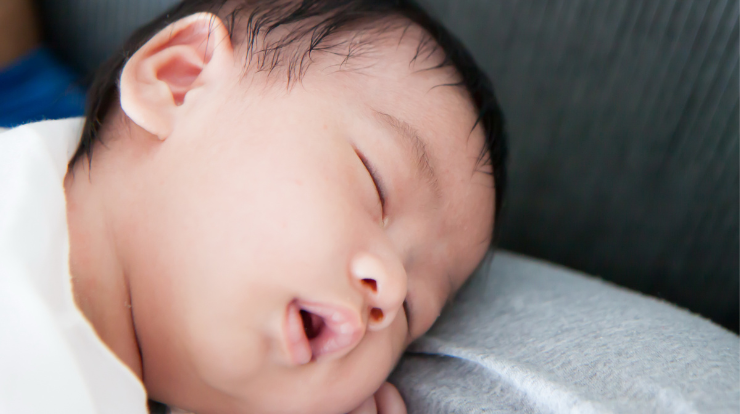
Is it normal for a baby to always sleep with an open mouth?
We are often asked about baby sleep and whether it is normal for them to always sleep with an open mouth. Maybe you wonder what to do or who to see about this.
Is it normal if my baby always sleeps with her mouth open?
When babies sleep, physiologically, their mouth should be closed, and the tongue should be up in the palate area. Therefore, sleeping with the mouth open is not what we should see on a regular basis, although there are exceptions.
Sometimes, babies can indeed sleep with their mouths open, and if this is only occasionally, it’s generally not a cause of concern. Babies can sleep with their mouths open for several reasons:
- Nasal congestion: Babies, especially newborns, may have a blocked nose due to nasal congestion or mucus. This may cause them to breathe through their mouth, making air entering easier.
- Position: The position in which a baby sleeps can also influence whether they sleep with their mouth open. Some positions, such as sleeping on the back, in someone’s arms, or in a baby carrier, may cause the baby to keep the mouth open.
If it happens only in these circumstances and occasionally, it’s nothing to worry about, as it can also happen to adults. But when sleeping with the mouth open and with the tongue on the floor of the mouth happens constantly, and the baby always sleeps like this; the recommendation would be to check what is going on.
When else should I get my baby checked out?
In addition, some other symptoms or circumstances may accompany these two things, sleeping with an open mouth and the tongue down, that make the need to check the baby’s mouth more evident:
- Pain
- Frequent and different breastfeeding difficulties
- Milk dripping from the corners of the baby’s mouth
- Poor weight gain
- Very long feeds at the breast (more than one hour in the first months)
- Discomfort when breastfeeding or breastfeeding “rejection”
- Continuous clicking noises at the breast
- Baby snores when sleeping
Babies who always have their mouths open are so-called mouth-breathers, and this causes a series of modifications in functions and structures.
What needs to be checked?
Therefore, what usually needs to be checked in these cases is whether the baby has a tongue-tie (ankyloglossia). This is when the band of tissue that connects the tongue to the floor of the mouth is shorter than normal.
This can prevent the normal movement of the tongue, which in turn can affect various oral functions such as eating, sucking, chewing, swallowing, and speaking.
In some cases of tongue-tie, babies may have difficulties sucking adequately during breastfeeding, and this may also be observed with bottle-feeding.
Can this be a problem?
Babies with tongue-tie are usually mouth breathers; that is, they breathe through their mouths instead of their noses and can face various problems and complications due to this way of breathing.
Some of the common problems associated with mouth breathing in babies include:
- Abnormal development of the jaw, palate, and later teeth: Prolonged mouth breathing can affect the development of the teeth and jaw, leading to dental alignment problems, malocclusions, and facial deformities. The palate depends on the positioning of the tongue to widen. The tongue’s pressure on the palate shapes it into a U-shape, which provides vital space for the teeth to grow.
- Sleep apnea: mouth breathing may be associated with developing sleep apnea, a disorder in which breathing is interrupted during sleep. This can lead to broken sleep and daytime sleepiness for the baby.
- Increased risk of respiratory infections: Breathing through the mouth can make a baby more prone to upper respiratory diseases, such as colds and sinusitis, as the nose has natural mechanisms to filter and humidify the air breathed in.
- Ear problems: Prolonged mouth breathing can affect the Eustachian tube, the tube that connects the middle ear to the back of the throat. This can increase the risk of ear infections and hearing problems.
- Sleep problems and daytime tiredness: Oral respiration can interfere with normal sleep, leading to daytime tiredness and affecting the baby’s behavior and mood.
- Problems in speech development: Mouth breathing can influence speech development, causing difficulties pronouncing some letters because the tongue cannot position itself correctly. In any case, this can only be reviewed by a professional from the age of 4 years onwards.
What can be done?
It is critical to address any mouth-breathing problems in babies to prevent long-term complications.
If you suspect that your baby is a mouth breather and is experiencing related problems, we recommend you consult with a speech and language therapist with expertise in myofunctional therapy. They can assess and give specific guidelines to encourage the baby to close the mouth when resting and later, if necessary, refer to a pediatric ENT surgeon.